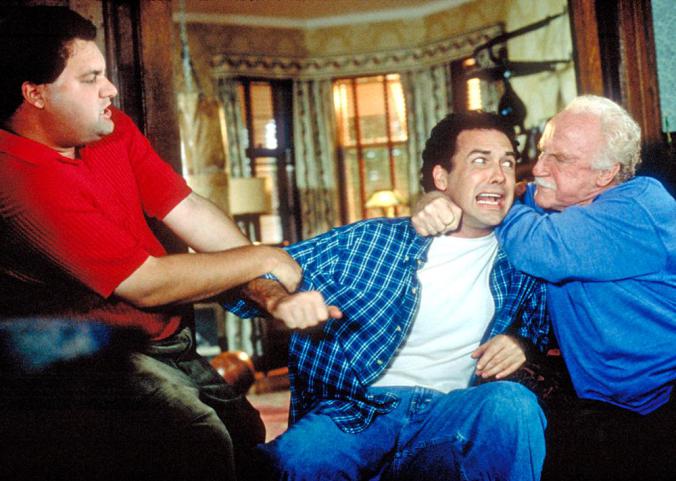Dirty Work (1998)
Dir. Bob Saget
Written by: Frank Sebastiano, Norm Macdonald, Fred Wolf
Starring: Norm Macdonald, Artie Lange, Traylor Howard, Christopher McDonald
Early on in this project while writing about Belly, I called it “probably the worst movie, objectively speaking,” that I had reviewed to that point in this project. If you go back and read the review, however, you’ll find that Belly is actually a film that I genuinely enjoy and watch often, and that in spite of some of its cinematic shortcomings, I found some interesting things throughout the film to write about. While Belly looks more like an auspicious debut that hinted at great promise never really fulfilled by its director, Hype Williams, Dirty Work could be viewed more as the hacky, sophomoric comedy that it really is. It is definitely the worst movie that I’ve written about for this project, displaying none of the artistic flair of some of the other “bad” movies that I’ve reviewed. However, Dirty Work will always have a place in my heart. It is truly one of my favorite movies, and I don’t even classify it as a guilty pleasure, because I enjoy it fully, without irony, and without shame. Dirty Work is a bad movie, but, to me, it’s endlessly quotable and rewatchable. In a way, it’s the perfect movie to close out the first year of this project on, because I’m fairly certain that I’ll be one of a very select few to have written a gushing, unabashedly positive review of this much-maligned, oft-forgotten, footnote of cinematic comedy.

Dirty Work tells the story of Mitch (Macdonald) and Sam (Lange), two underachievers who have been friends since childhood. Growing up, the pair are taught by Sam’s father, Pops (Jack Warden), to not take crap off of anybody. Taking that lesson to heart, as children they make it their mission to serve comeuppance to anyone who wrongs them, child and adult alike. However, when they grow up, they find themselves too often on the receiving end of the comeuppance. Mitch in particular has a difficult time fitting into society, losing 14 jobs and his girlfriend in a matter of three months. Down and out, Mitch asks to move in with Sam and Pops, and shortly thereafter, Pops suffers a severe heart attack. When the two friends are faced with raising $50,000 to secure Pops a heart transplant, they first try their hands at a series of odd jobs, but soon realize that the key to raising the money to save Pops is by returning to their roots as revenge artists. They open up a revenge-for-hire business and offer to do other people’s dirty work for them, all the while saving up money to save Pops. Along the way, Mitch meets a woman whom he falls in love with, Kathy (Traylor), and ends up running afoul of the town’s most powerful citizen, Travis Cole (McDonald). Cole tries to trick Mitch and Sam into helping him condemn a build that he owns, but they eventually turn the tables on Cole and end up getting the last laugh. In the end of the film, Pops gets his heart transplant, Mitch gets the girl, and Cole is railroaded out of town after being exposed for the fraud that he is.
Dirty Work was added to my collection in the summer of 2002. That year, I spent about two weeks cooped up inside the house recovering from a bout of mononucleosis. As such, my mother picked up a few inexpensive DVDs to keep me occupied while I was homebound. One of these bargain bin finds was Dirty Work, and I probably watched the film a half dozen times in those two weeks. I had already seen it in the movie theater with some friends when I was about 13 years old, but it didn’t really stick out to me at that time. I was a latchkey kid back then, and I would often come home from elementary and middle school and watch reruns of “Saturday Night Live” on cable while I waiting for my parents to get home from work. I had gotten introduced to Norm Macdonald’s wry, dry sense of humor through these afternoon television watching sessions, and, as a result, I was a member of the small demographic that was actually interested in Dirty Work when it was released. The movie didn’t make a huge impression on me, but I can remember enjoying it a good bit. I loved the callbacks that Norm did to his Weekend Update persona, pulling out a Dictaphone and recording “notes to self,” and my friends and I were all fans of Chris Farley’s performance as Jimmy, Mitch and Sam’s bar buddy who had his nose bitten off by a Saigon whore, but overall the movie didn’t really stick with me after that initial viewing. Since receiving it on DVD, however, Dirty Work has been a staple of my viewing schedule for the past 15+ years. I don’t know if its offbeat, mocking style of humor needed some time to grow on me, or if part of the joy of the movie lies in repetition, but the older I get and the more times I watch Dirty Work, the more I want to watch and enjoy it again and again.

I think the common line of thought on Dirty Work, if the film is even thought of at all, is that it is a simple, sophomoric comedy, loosely and conveniently plotted, and filled with gross-out humor. On the surface, this is an absolutely accurate description of Dirty Work, but after nearly 100 viewings, I’ve come away with a much different reading of the film. Sure, Dirty Work is a “bad” movie, but I think that it is intentionally so. It’s a nudging, winking meta-film, poking fun at the cookie cutter studio comedies of the time, and standing as a prime example of anti-comedy, much like Saget’s and Macdonald’s other work. These are two master comedians, with a great understanding of and appreciation for the history of the medium, and the nature of humor, in general, and I simply find it hard to believe that they combined to create a movie that is crass for the sake of being crass. Though it features many alumni of the institution in cameo roles, Dirty Work is something of a send up of the morass that Saturday Night Live-inspired movies had become by the late 1990s. Similarly to an SNL film, the central conceit of a revenge-for-hire business feels like a sketch that has been pushed beyond its boundaries, but rather than relying on catch phrases or recurring oddball characters for a nostalgic sort of humor, Saget and Macdonald rely on escalating levels of absurdity, cringe-inducing anti-humor, and a defining performance from Macdonald, one of SNL’s most maligned cast members of the 90s. They combine these elements to create a chaotic comedic maelstrom that certainly isn’t for everyone, but which fully hits home with me.

Of course I realize that a viewer’s enjoyment of Dirty Work is going to be directly related to their enjoyment of Norm MacDonald’s particular brand of wry, winking humor. MacDonald, something of a “comedian’s comedian” and certainly an acquired taste when it comes to mainstream comedians, is essentially playing a version of himself in the film, imbuing Mitch’s character with all of his trademark quirks and mannerisms, familiar from his stint behind the anchor desk at SNL’s Weekend Update. MacDonald does try to act in the film, although he’s best when he isn’t trying to force himself into a character and is instead allowing Mitch and the film, in general, to be a vehicle for his comedic stylings. To say that Norm MacDonald is a bad actor isn’t a hot take or a novel idea, but his brand of monotone non-acting is perfect in this film that he co-wrote for himself. The film’s humor largely stems from MacDonald’s deadpan line delivery, and his presence as a straight man in a very zany world. He also proves himself adept at physical comedy, not something that he was normally associated with, through a very funny running gag that sees Mitch being physically tossed through a series of windows. I can understand that MacDonald’s presence in the film on its own might serve as a stumbling block for the uninitiated, but I can’t picture another comedian or actor delivering some of the lines that he wrote, much less with a completely straight face. He anchors the film, not necessarily with a great performance, but with a certain comedic sensibility that is necessary for the rest of the film’s antics to revolve around.

The rest of the stars orbiting MacDonald do so admirably. The film’s true supporting actors, Artie Lange as Sam and Traylor Howard as Kathy, don’t really stand out much, but Dirty Work is full of excellent cameos from some big name comedians. I mentioned him already, but Chris Farley’s role in Dirty Work is one of my favorite of his. He only has a few scenes, but he makes the most of them, and leaves a memorable impression in what would be the final film he worked on before his death. His character, Jimmy, is one note, a barfly who has sworn revenge on the Saigon whore who bit off his nose, but Farley brings his irrepressible physicality and charm to the role, playing against type as a somewhat villainous maniac. The scene, early in the film, where he confidently queues of the Rolling Stones classic, “Street Fighting Man,” on the bar jukebox before Mitch and Sam get in a brawl, only to push the wrong button and underscore the fight with Rupert Holmes’s “Pina Colada Song,” is one of my favorites in all of film comedy. Chevy Chase also shines as the degenerate gambler physician who offers to bump Pops’s transplant up on the list if Mitch and Sam can raise enough cash to help him pay off his bookies. Like Farley, Chase makes the most of his limited screen time, providing classic one-liners that feel improvised. His comedic timing is as excellent as always, and he has mastered the understated delivery that can drive a joke home before the audience even realizes it has been uttered. Don Rickles delivers some devastating insult comedy in a brief appearance that really served as my introduction to his brand of acerbic, vitriolic comedy. He debases Sam and Mitch, as well as the other employees at the movie theater where they are briefly employed, with such cutting quips. The scene leaves me laughing out loud no matter how many times I see it.

I could be wrong. Dirty Work could be just an ordinary, run-of-the-mill bad movie. It certainly seems to be that way on first blush. Saget’s direction in the film would be most generously described as competent. The script is both outlandish and simplistic, often settling for lowest common denominator punchlines and toilet humor. The film’s lead actor turns in a performance that seems almost determinedly wooden. However, despite all that, I honestly feel that the film is a twisted work of comedic genius. I really think that it was a movie ahead of its time, engaging in the type of anti-comedy that would become popular a decade later, at least in underground comedy scenes. It isn’t the type of movie that could ever become a classic, even of the cult variety, but I have rarely found a person who I’ve showed the film to or reminisced about it with who doesn’t find something about it to enjoy. I don’t know if my lionizing of the film is a sort of justification, but I also don’t feel that my outright admiration for Dirty Work is something that needs to really be justified. I’ve rarely subscribed to perceived dichotomies between high and low culture, and I’ve been even more reluctant to cast my lot with existing cultural values when it comes to art. I believe that, increasingly so, great art can come from any number of sources, and that beauty is often in the eye of the beholder. Writing about 50 different movies from my own personal collection this year has reminded that there’s really no accounting for personal taste. People should like what they like, and watch what they want to watch. If a movie makes you happy or gives you some relief or distraction from life’s many problems, even for just a couple of hours, enjoy the hell out of it. Happy New Year.
Share this:





